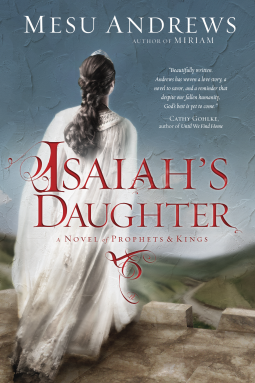
Isaiah's Daughter
A Novel of Prophets and Kings
by Mesu Andrews
This title was previously available on NetGalley and is now archived.
Send NetGalley books directly to your Kindle or Kindle app
1
To read on a Kindle or Kindle app, please add kindle@netgalley.com as an approved email address to receive files in your Amazon account. Click here for step-by-step instructions.
2
Also find your Kindle email address within your Amazon account, and enter it here.
Pub Date Jan 16 2018 | Archive Date Jan 13 2020
WaterBrook & Multnomah | WaterBrook
Talking about this book? Use #IsaiahsDaughter #NetGalley. More hashtag tips!
Description
Isaiah adopts Ishma, giving her a new name--Zibah, delight of the Lord--thereby ensuring her royal pedigree. Ishma came to the prophet's home, devastated after watching her family destroyed and living as a captive. But as the years pass, Zibah's lively spirit wins Prince Hezekiah's favor, a boy determined to rebuild the kingdom his father has nearly destroyed. But loving this man will awake in her all the fears and pain of her past and she must turn to the only One who can give life, calm her fears, and deliver a nation.
"Andrews (The Pharaoh’s Daughter) offers her unique brand of in-depth Bible knowledge and storytelling flair ... [she] is gifted at bringing the past to life..." —Publishers Weekly (starred review)
Available Editions
| EDITION | Other Format |
| ISBN | 9780735290259 |
| PRICE | $17.00 (USD) |
| PAGES | 400 |
Featured Reviews
 Reviewer 96742
Reviewer 96742
This is an extraordinary reimagining of the backstory of a rather minor character in the annals of history (I think she’s only actually mentioned once in the Bible)–Queen Hephzibah, wife of godly King Hezekiah of Judah and mother of very ungodly King Manasseh of Judah. It’s a coming-of-age story, but it’s also so much more than that. It is a tale of love, hope, strength, determination, and faith.
I know that this is a work of fiction, but it is so beautifully told and weaves the words of prophets and kings directly from Scripture so seamlessly, that it seems amazingly real! Mesu Andrews brought the world of Isaiah to life for me as I’ve never imagined before, and I enjoyed every minute of reading this book.
Biblical fiction, such as Isaiah’s Daughter, can bring a new depth of cultural and historical understanding to your study of the Word, while entertaining you wonderfully. I’d highly recommend you snatch up a copy for both the enjoyment and education!
Many thanks to WaterBrook & Multnomah and NetGalley for the digital copy of this book for review purposes. I was not required to give a positive review. All opinions are my very own! 🙂
 Loraine E, Reviewer
Loraine E, Reviewer
Obvious intensive research brought to life this epic book about Hephzibah, the daughter of the prophet Isaiah in the Bible. Both Isaiah and his wife were listed as prophets in the Bible. Hephzibah was the wife of King Hezekiah, Judah's most righteous King, Hezekiah's father, Ahaz, was a wicked King and an idolator; and Hezekiah's son, Manasseh, was even more wicked. Although Biblical fiction has to fill in the bits and pieces to create a storyline, Andrews drew as much as possible from the Bible and historical research to create a realistic and believable story that does not depart from God's word.
I loved that the story was told from the point of view of Ishma (aka Hephzibah) from her early childhood through the death of King Hezekiah. From barbaric torture by the Assyrians to an incredible belief in Yahweh, Hephzibah lives a life that is filled with highs and lows. Her story brings to life the kingdom of Judah which helped me understand much better the sections of the Bible dealing with the rise and fall of King Ahaz and King Hezekiah as well as the life and culture of this time period. I am sure returning to read these portions of the Bible will make them much more understandable.
Definitely Biblical fiction at it finest.
**I received a complimentary copy from Waterbrook Publishing through NetGalleyt to facilitate this review. Opinions are mine alone. I was not compensated for this review.
 Kaleigh S, Reviewer
Kaleigh S, Reviewer
From the first few words of this book, the reader enters the whirlwind of activity that might not be too inaccurate from the Israelites' long past. Andrews relates the story of Ishma. Perhaps she was named for the past, present, or future desolation that she and the nation of Israel experienced, for that is what Ishma means--"desolation". And yet, though her new master, Isaiah, gives her a new name meaning "delight of the Lord", she still struggles with the desolation inside herself and throughout her nation.
There are so many things to love about this book...and to learn as well. I love Yaira's unwavering commitment to the Lord's will through her life, despite the tragic events. I love Hezi's devotion to God even when he lived in the center of wicked palace life. I love Isaiah’s perseverance and courage to prophecy even though it might take his life. And Ishma…I love her for who she is and who she becomes.
Andrews weaves an incredible story surrounding the period of King Ahaz and King Hezekiah, while creating fictional characters to emphasize the humanity of men and the awesomeness of God. I’m still not quite sure I appreciated the portrayal of Isaiah as a righteous prophet yet often misinterpreting prophecies based on his opinion, but I suppose some things are an author’s liberty. ;) And at times I thought Queen Abijah was a bit too fictional, but in no way did either of these elements detract from the message of this book. I loved Isaiah's prophecy because it showed how people could misinterpret God's word at that time, but also it showed how greatly they longed for the coming Messiah and how they lived in the expectation of that hope.
The history that was well-written and included throughout the chapters. Each chapters opens with a passage of Scripture—often from Isaiah and it’s amazing to see how some of the culture and Jewish history would be present in such scenes. Often we read our Bibles with our 21st century mindset and because we know the stories so well, we forget the nation of Israel and its customs and its people. What they wore, how they lived, what they ate and sold, and what they did for work. And sometimes we even forget that they had feelings too. They were fearful for their future, being surrounded by enemies, receiving warnings and prophecies that were uncertain and not always able to be interpreted right away. They had to wait too. They suffered persecution and judgment and yet in the end still remained the beloved people of God. Hephzibah’s title reminds Isaiah and the king (and yes, herself) that God does turn mourning into gladness, and that, after the darkest of nights, joy comes at dawn.
Readers who liked this book also liked:
Kelley Armstrong
Historical Fiction, Mystery & Thrillers, Sci Fi & Fantasy


















